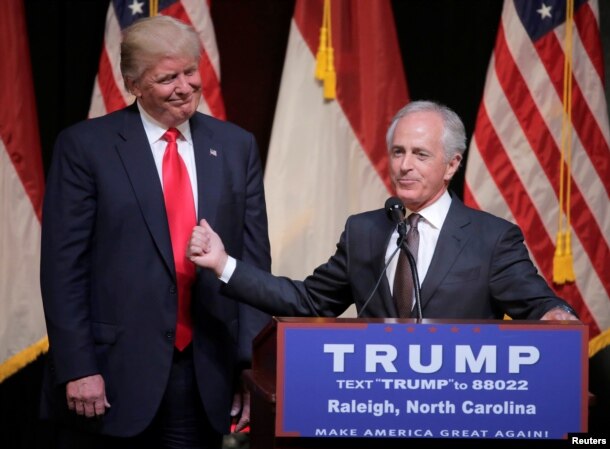Trump Will Make Impact on Global Stage, Corker Predicts

Michael Bowman
VOA NEWS
CAPITOL HILL — VOA senate correspondent Michael Bowman spoke Tuesday with Sen. Bob Corker, chairman of the Senate Foreign Relations committee. Here is an edited transcript of that interview.
Q: Confirmation hearing soon for your new Cabinet position?
Bob Corker: I know my name is in the mix. Some people that have been very centrally involved and been out there, they are more likely perused for that kind of job.
Q: Name two or three things in global affairs that you think Donald Trump could do a better job [at] than President Obama has done.
BC: There’s a greater likelihood, as it relates to NATO, that there is a fuller partnership that is established on a quicker timetable. Everyone has concerns. I remember years ago [former U.S. Secretary of State] Madeline Albright being concerned that partners of NATO [were] not carrying their full load. With President Trump, there is a likelihood [we] get to a place we should have gotten to before much more quickly. I hope the alliance will be strong, maybe even stronger. It’s been frustrating that we only have a few partners that are spending what they should be spending on defense. We’ve already seen, our counterparts — I don’t say this to be pejorative, just an observation — people on both sides of the aisle would agree that President Obama was not feared. The uncertainties people have relative to Mr. Trump, the fact that he does have a very strong personality, could lead to us resolving our differences with China and other places more readily. People are guessing what the future is going to be. Having a degree of uncertainty is not bad when you’ve had perplexing issues, difficult to deal with, and you start afresh.

FILE – Republican U.S. presidential candidate Donald Trump listens as Sen. Bob Corker speaks at a campaign rally in Raleigh, North Carolina, July 5, 2016.
Q: What about the Iran nuclear deal? We spoke at length about that, and you have not been a fan of that deal from the beginning.
BC: What you’re going to see on a bipartisan basis [is] Congress playing a bigger role and pushing back. My Democratic colleagues felt strong on Iran, and they had an administration that they knew was going to veto or push back against their activities that were outside of what was agreed upon. That’s an area where there will be a lot of bipartisanship — pushing back against missile testing, the buying of conventional weapons they are not supposed to be purchasing. I see that as an area of bipartisanship that will be good for our country.
Q: But ripping it up as opposed to taking a fresh look at it?
BC: I remember he said, when a number of people said they were going to rip it up and he said, ‘Well, we will see where we are at the time.’ … We haven’t been able to push back because of pushback from the administration. You’re going to see much stronger efforts there. What the next secretary of state will realize is: Look, what we want to do is build consensus with our partners. And Iran, if we continue to push back as we should be doing, which we are not now doing, Iran will create, just because of their nature, the opportunity for a renegotiation of where we are.
Q: Finally, so much has been made of Donald Trump’s statements on Vladimir Putin and speculation on U.S.-Russian relations under the incoming administration. What are you expecting out of those two remarks?
BC: You really don’t know those things. It’s always good when leaders of two important countries start off on a good foot. There have been some things said between the two of them that have been unique throughout the course of this campaign. Who’s playing who? I don’t know. If you look at efforts made in last six months, the outcome was something that all that the experts did not predict. The same thing could be true in foreign policy, from the standpoint of it benefiting our national interest. I hope that is the case.

